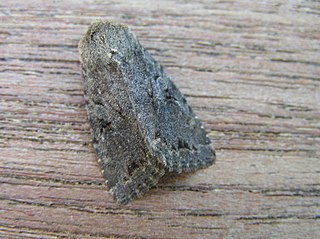Related Research Articles

Apamea crenata, known as the clouded-bordered brindle, is a moth in the Noctuidae family. It is distributed throughout the Palearctic realm.

Fissipunctia ypsillon, the dingy shears, is a species of moth of the family Noctuidae. It is found in the Palearctic realm.

Schrankia costaestrigalis, the pinion-streaked snout, is a species of moth of the family Erebidae. It is found in Europe, the Canaries, Madeira, Syria, Armenia. It is also present in New Zealand. The species closely resembles Crambidae or Pyralidae species.

Mythimna decisissima is a moth of the family Noctuidae first described by Francis Walker in 1856. It is found from India across south-east Asia including Hong Kong, Japan, Taiwan and Australia in Queensland and New South Wales. It is also present in South Africa.

Grammodes stolida, the geometrician, is a moth of the family Erebidae. The species was first described by Johan Christian Fabricius in 1775. It is found in Africa, southern Europe, most of Asia and Australia. It migrates to central and northern Europe as far north as England, Denmark and Finland.
Tebenna immutabilis is a moth of the family Choreutidae. It is known from the United States, including California.
Haimbachia strigulalis is a moth in the family Crambidae. It was described by George Hampson in 1896. It is found in India, Sri Lanka and China.
Pycnarmon leucinodialis is a moth in the family Crambidae described by William Schaus in 1912. It is found in Costa Rica.
Sufetula polystrialis is a moth in the family Crambidae. It was described by George Hampson in 1912. It is found on the Louisiade Islands.
Tatobotys albivenalis is a moth in the family Crambidae. It was described by George Hampson in 1897. It is found in Japan's Ogasawara Islands.
Tyspanodes creaghi is a moth in the family Crambidae. It was described by George Hampson in 1898. It is found on Borneo and in Papua New Guinea and Australia, where it has been recorded from Queensland.
Ambia mesoscotalis is a moth in the family Crambidae. It is found in Indonesia, where it has been recorded from the Maluku Islands (Banda).
Oreta bicolor is a moth in the family Drepanidae. It was described by William Warren in 1897. It is found in Sundaland and Malaysia.
Calliprora sexstrigella is a moth of the family Gelechiidae. It is found in North America, where it has been recorded from Arizona, California, New Mexico and Texas.
Aristotelia penicillata is a moth of the family Gelechiidae. It was described by Walsingham in 1897. It is found in West Indies, where it has been recorded from Haiti.
Isophrictis canicostella is a moth of the family Gelechiidae. It was described by Walsingham in 1888. It is found in North America, where it has been recorded from California and Colorado.
Metzneria castiliella is a moth of the family Gelechiidae. It was described by Moschler in 1866. It is found in Portugal, Spain, on Malta, the Canary Islands, in North Africa, on Crete, Cyprus and in Palestine.
Polyhymno convergens is a moth of the family Gelechiidae. It was described by Walsingham in 1911. It is found in Mexico (Guerrero).
Gonioterma fastigata is a moth of the family Depressariidae. It is found in Guyana.
Xylorycta chrysomela is a species of moth in the family Xyloryctidae. It was described by Oswald Bertram Lower in 1897. It is found in Australia, where it has been recorded from the Northern Territory and Queensland.
References
- ↑ Nuss, M.; et al. (2003–2014). "GlobIZ search". Global Information System on Pyraloidea. Retrieved July 15, 2014.
- ↑ Transactions of the Entomological Society of London 1897: 204
| This Margaroniini-related article is a stub. You can help Wikipedia by expanding it. |